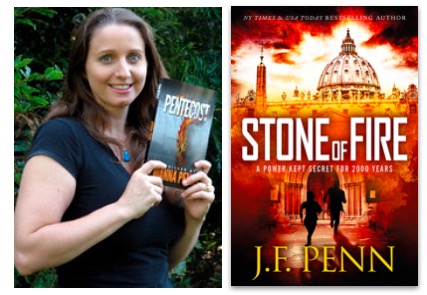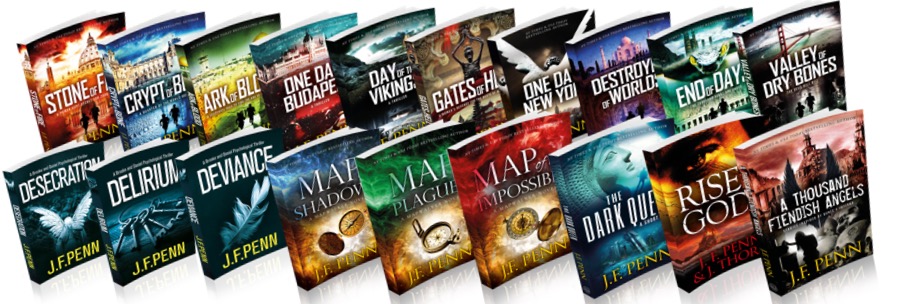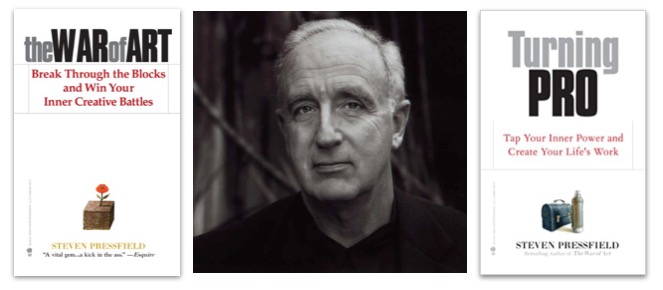It’s episode 500! Time flies indeed.
The first episode of The Creative Penn Podcast was released on 15 March 2009. I had a couple of non-fiction books out, the international Kindle had not even launched, and there was no empowered indie author movement as we know it today. I was living in Ipswich, just outside Brisbane, Australia and I worked as an IT consultant implementing SAP Financials at a large mining company. How things have changed!
I’m now a full-time author and podcaster with over 30 books, fiction and non-fiction. I live in Bath, UK and I’m part of a growing independent author scene. We have more opportunities than ever before and it truly is the best time to be an author!
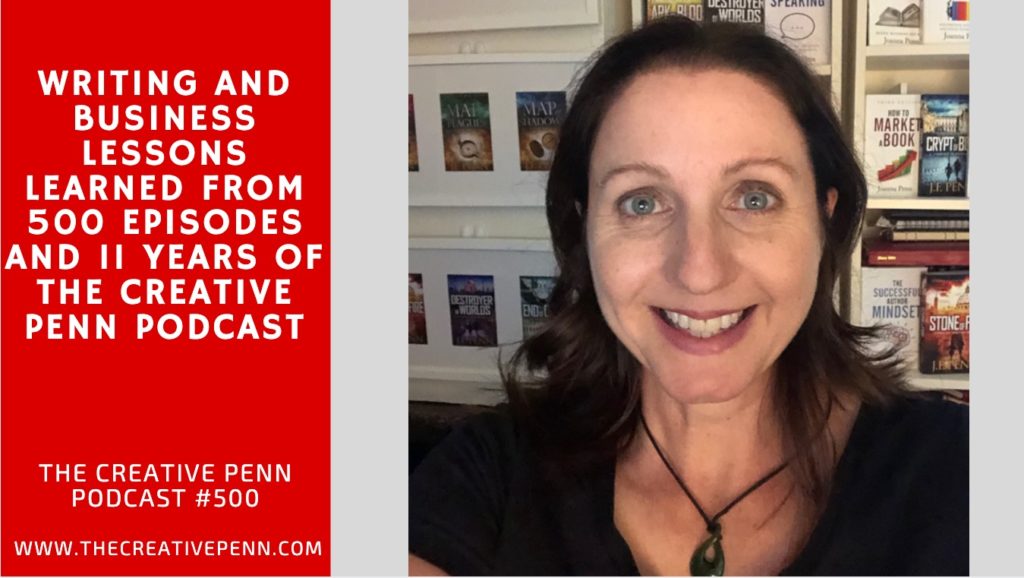
In this episode, I’m going to share some of the biggest lessons I’ve learned over the last 11 years and include clips from podcast episodes that helped me and can help you on your own author journey — some are craft and some are business.
This episode covers:
- Write what you love
- It’s OK to suck in your first draft. Editing is the process that will turn your book into a finished product.
- We are independent authors. We create and license intellectual property assets.
- All long-term book marketing comes down to one thing
- Turning pro and long term thinking. The mindset of the professional author.
- Next steps: What’s changing for The Creative Penn?
Today’s show is sponsored by my wonderful patrons who support the podcast with a few dollars a month through patreon.com/thecreativepenn. Patrons get an extra Q&A show every month — bonus audio! — and also 10% off my courses. Thank you, Patrons!
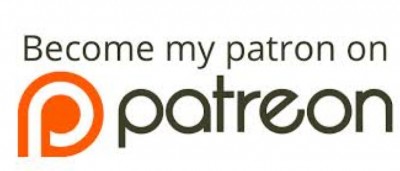 Thanks to my long-term listeners of the podcast and also to the long-term sponsors of the show, Kobo Writing Life, Draft2Digital, Ingram Spark, and more recent sponsors FindawayVoices and ProWritingAid.
Thanks to my long-term listeners of the podcast and also to the long-term sponsors of the show, Kobo Writing Life, Draft2Digital, Ingram Spark, and more recent sponsors FindawayVoices and ProWritingAid.
(1) Write what you love
In episode 16, June 2009, I interviewed Tom Evans, back then known as The Bookwright, about writer’s block.
Up until that interview, I had only written non-fiction, and I was afraid of writing fiction. I didn’t think I had a block but I clearly did and I realized it as part of this discussion.
The ‘block’ was based on my education and background — my parents were teachers, and I did a Masters at the University of Oxford in Theology, so I was steeped in the literary tradition. I thought I had to write something literary whereas my guilty pleasure and my escape from the day job was binge-reading thrillers and watching action movies.
Once I realized that I could just write what I loved to read instead of something others thought ‘worthy,’ I was off and writing. I started writing Pentecost (re-edited and re-titled as Stone of Fire in 2012) and I now have 18 novels — and counting!
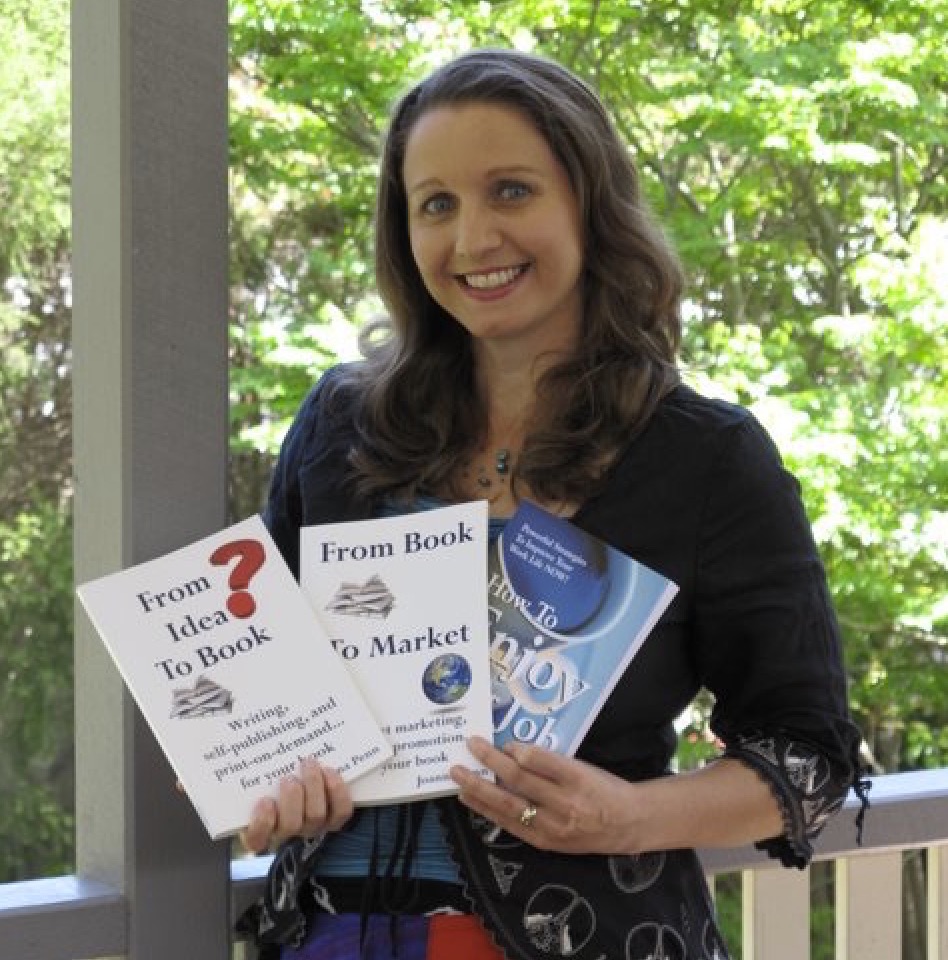
With some of my early books in 2009 (no longer available in those editions!)
I didn’t have such a good mic set-up back then so it’s a bit breathy, but I think you’ll find it interesting.
Joanna Penn: You know, now you’re making me think, I’m just thinking about something about myself. I’ve written three nonfiction books now, and I have a blog and I do a lot of writing and I’m quite confident in that, but I feel like I almost … I can’t write fiction, you know, that’s kind of in my head as something I can’t do. Maybe there are other people who are listening who might feel that way, too.
Tom Evans: Have you ever told stories to children at night, or niece and nephews? Have you ever made things up?
Joanna Penn: Yes. I mean I think I could write it, but I’m just not doing it.
Tom Evans: Okay. So you have to want to make a point. This fiction isn’t just some yarn. I’m going to spin out. It’s going to make a point. It is going to make a difference. So you’ve got what I call meta constructs behind the book, things that you want to get over, and also you’ve got something that you want to get through yourself.
So you’ve got a personal motivation to get the book written that could just be personal pride, or it might be, for example, I’m halfway through a book called Soulwave which explains high-level concepts on consciousness. And I could write a scientific book about that, but it takes me a long time to do research and to back everything up. So I’m finding it a lot easier just to write the whole thing as a story and as a metaphor, what happens.
Not only does it allow you to be completely creative, but you can also get points across to people at an unconscious level, which has a much deeper resonance, you know, like books, like Who Moved My Cheese and that sort of thing. It allows you to get very deep but at a very simple level.
Joanna Penn: That’s fascinating. I must stop talking about me but I think a lot of people listening will have similar issues too. I guess what I’m talking about and what you’re saying resonates with me. It’s very valuable.
You can listen to the entire episode 16 here.
It’s fascinating to hear me say that I can’t write fiction! I hope that encourages you if you feel the same way.
A couple of other comments on this. Back in 2009, I didn’t do a personal introduction to the show and I say there, “I must stop talking about me.” I thought it was all about the interviewee and I didn’t understand the ‘know, like, and trust’ principle at the time. Podcasting is all about a personal connection with the host over the long-term, as well as the useful things you might learn in each episode. I needed to lean into being me, but I certainly wasn’t confident enough to do that back then. I didn’t think anyone would be interested in my journey. The same applies to your books. Your readers are interested in you, so share from your personal experience in your emails and also in your writing.
So, if you’re starting out, I hope this snippet encourages you because back then, I was finding it so hard to move into fiction and now I can’t imagine not writing stories. I have so many I want to write, so many in my queue! I just needed to get through that initial block and start writing.
Tom Evans has written a lot of books since 2009, and he’s also a very popular meditation guide on Insight Timer. But he only published Soul Waves this year, in Jan 2020. That book needed a lot of wrangling and I know it means a lot to him. We talk about many of these things on his podcast, The Zone Show, on creating your own future.
(2) It’s OK to suck in your first draft. Editing is the process that will turn your book into a finished product.
I listened to a lot of podcasts before I started my own. I used to love Mur Lafferty’s I Should Be Writing, which has been running since 2005 and is still going. Mur is a Hugo award-winning author and podcaster and focuses on the traditional publishing path on her show, although she is a hybrid author and has done all kinds of interesting books over the years.
This episode went out in November 2009 during my first NaNoWriMo. I was learning so much about writing and editing and discovering that the journey of a novel is very different to that of a non-fiction book.
Joanna Penn: You share your lessons learned on your podcast, I Should Be Writing. You talk a lot about things you’ve learned which I really appreciate. I really recommend your podcast to people. One of the things you did, recently was talk about “It’s okay to suck,” which I thought was brilliant. Maybe you could just talk a bit about that?
Mur Lafferty: So it’s something about writing and I believe it’s that we all use words every single day to communicate and that makes people think that if I can tell you about the funny thing that happened to me at the grocery store today, then I can write a novel because I’m already using words.
So everyone thinks they can write and then they sit down to do it and everybody has this great idea, but they sit down to write it and if you haven’t been writing your whole life or haven’t been writing for the past couple of years, then the story’s probably going to suck.
I say that just as complete honesty. I try to equate it to sports. I mean, if you say I’d like to run a marathon, are you going to step out of your door and run that marathon straight away?
No, you’ll hurt yourself. But you know, that’s when you start. Going out and running a little bit every day. If you allow yourself to have a couple of bad days or a couple of races where you don’t perform that well, you’ll be better the next time.
So I think when you let go of this one perfect shining idea I have in my head, this is going to be the thing to make me famous and wonderful and money and groupies and all sorts of awesomeness. Just say, I’m going to tell a story and it may or may not be good, but when I’m done, I will have gotten a little bit better at least.
And I think, when people allow themselves to just write the story and not worry about what’s going to happen to the story afterward, that’s when they really let themselves actually improve. It’s like when they’re thinking about it too much, they hold themselves back or they put some sort of handicap on themselves. But when they just write and not worry about sucking or worrying about how good it is or where it’s gonna be published, then better things happen.
You can listen to the rest of the episode with Mur Lafferty here.
It seems obvious to me now but back then, I still thought that fiction writers sat down and streamed something perfect onto the page. There was a lot more mystery around writing back then. Not many blogs and podcasts, and social media was only just starting to take off. Realizing that you could write something terrible and then fix it up later with editing freed me from so much. My first drafts are a lot better now, but we all have to go through those first few books where we don’t know what we’re doing!
I wrote 20,000 words in that NaNoWriMo and probably only used about 5000 of those in the finished book, but it took me onto the next step, and sometimes, that’s all we need!
You can find the journey of that first novel here. There are many more lessons on the writing craft that I have learned along the way, but those two underpin everything.

I like writing in cafes 
(3) We are independent authors. We create and license intellectual property assets.
Moving into business, this lesson transformed my understanding of the publishing industry and also enabled me to see how writing books could make me more money over time as I built my backlist. It helped me move into thinking long-term and valuing my work.
Like many authors, I used to be fixated on ‘the book,’ that one finished product I could hold in my hand and say, “I made this.” That is the artist’s head and it’s super important to start there. But if you want to take this seriously as a business, you have to learn to think like a publisher and a business owner.
As an author, you are an artist, for sure. But you also create and license intellectual property and that is where the wealth is.
It took a while for the penny to drop on this one, but once I understood it, I didn’t look back. I am all about licensing rights and creating multiple streams of income these days. I know the worth of my intellectual property assets, they are the basis of my business — as well as my art. If you understand this, you are an empowered writer!

If you don’t understand this yet, here are a few more book recommendations:
- Selective Rights Licensing: Sell Your Book Rights At Home and Abroad – Orna Ross and Helen Sedwick
- The Magic Bakery: Copyright in the Modern World of Fiction Publishing – Dean Wesley Smith
- Closing the Deal on Your Terms: Agents, Contracts and Other Considerations – Kristine Kathryn Rusch
- Rethinking the Writing Business – Kristine Kathryn Rusch
- The Copyright Handbook: What Every Writer Needs To Know – Stephen Fishman
Let’s start with the definition of rights as I discussed with Orna Ross in March 2016.
Orna Ross: Publishing rights are essentially the permission you grant to other people to produce some kind of format of your work. So they are protected by copyright. If copyright law didn’t exist, we wouldn’t have publishing rights to sell.
A lot of work went into securing copyright as a right for authors and as a result, we can turn our work into many things, audiobooks, maybe have a movie made, reprint rights, even reprographic rights, you know, people who photocopy your work are supposed to pay you a fee. There are just loads and loads of different rights and essentially the function of rights and publishing is to extend your readership and to add to your bottom line. They can really quite significantly add to the bottom line.
I think authors, indies, have not given enough thought to rights. Taking a publishing rights perspective on your work is the missing link for the indie author and it’s really important to trade publishing. They trade in rights. Because it’s a valuable commodity and very often in trade publishing the assessment as to whether to take on a book or not, the rights department will be key in that. Particularly for certain kinds of books which lend themselves to rights more than others. But, very often, the rights department will be called and asked what would the rights plan be? That will affect how much of an advance and investment a publisher is willing to put into a book. If it’s valuable to trade publishing, it’s valuable to indie publishers and to indie authors, but how we would go about the business of selling them might be different.
You can listen to the rest of the interview on how authors sell publishing rights here.
An aside on friendship and author community
I also want to digress a little and comment on friendship and community here.
At the beginning of the author journey, it’s inevitable to feel alone and on the outside of what feels like an exclusive club. You feel inadequate, you don’t think you can be friends with ‘real writers,’ but trust me, over time, as you write and network, online and off, you will meet true friends who really understand your creative side.
I met Orna Ross on Twitter in 2009. I was in Australia and she was in the UK. She guest-posted on The Creative Penn blog and I bought her creative meditation audios. I was still working in the mining industry and I literally had no author friends. I had a serious case of imposter syndrome even after writing a few books.
Orna and I met in person when I moved back to the UK in 2011. I left my consulting job to try and make the writing business work and we actually bumped into each other at the London Library where we both wrote. We went for coffee and became friends over the years. I was part of the early days of the formation of the Alliance of Independent Authors and I was at the launch at London Book Fair in 2012 when indie authors were still on the fringes of the industry.
Orna has taught me so much over the years — and she was one of the first to talk about rights licensing for indies. I’ve had her on the podcast multiple times over the years so you will know her lovely Irish voice — and we also do a monthly show together at the Ask ALLi Podcast, the advanced self-publishing salon. We’re good friends and regularly solve the problems of the world over drinks and dinner. I wanted to share that in case any of you feel lonely in the author world, and just to encourage you to network and connect with people online and then, just like dating, you might need to ask people for a coffee in real life or at a conference or something when we’re back out in the world again.
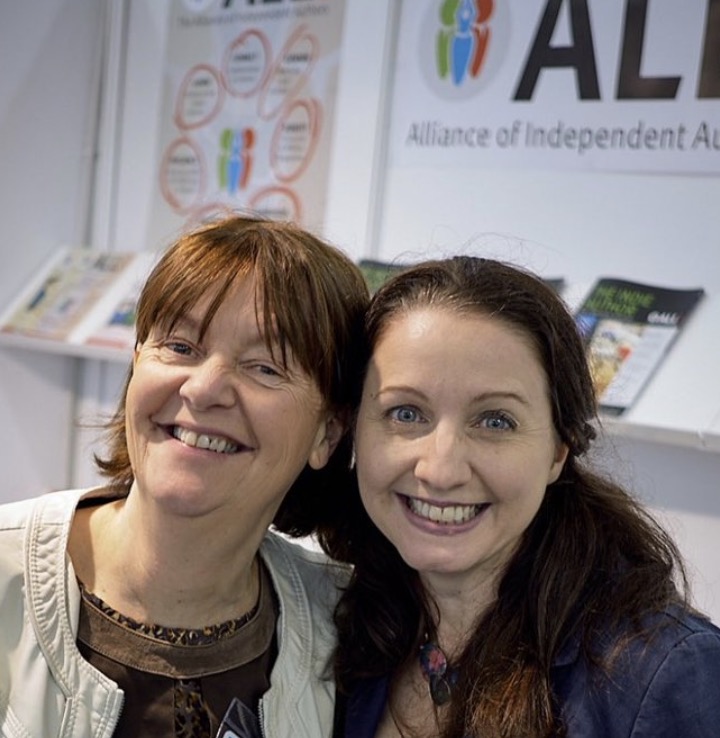
Me and Orna at London Book Fair, 2018
Over the years, I attended things like the Introduction to Rights seminar at the London Book Fair, as well as the Business Masterclass with Dean Wesley Smith and Kristine Kathryn Rusch in Oregon twice and Las Vegas last year. I’ve also read lots of books about it and generally up-skilled. I’ve also done a number of rights deals over the years including German, French, and Korean language for various formats, as well as short story rights in a number of ways.
So if it feels a little out of your comfort zone right now, don’t worry, you can learn this stuff — and however you want to publish, you need to know about it. If you are intending to sign a contract with anyone — agent, publisher, Hollywood, audio deal, whatever — you need to know this stuff. It will save you a lot of money and time and heartache along the way.
Back to rights and two more of my mentors on the writing journey.
Here’s Dean Wesley Smith on the metaphor of the Magic Bakery:
Dean Wesley Smith: I was struggling with ways of explaining copyright. So I came up with the magic pie. Just think of a pie and each piece of anything you slice out of that pie is a license that you’re licensing to someone to use part of.
Every time you write a short story or write a novel or write a nonfiction book or whatever, or anything that’s copyrightable, it forms a pie. Say you want to sell a short story to Asimov’s. You take that pie, you cut out and name that right. Whatever you and the other person agree to. That goes away, but it is still in the pie.
Nothing’s really sold. It’s magic and it’s probably stays there unless you do something like selling it all rights to New York, that magic pie stays. Those of us who have a lot of stuff created a bakery and also that helps explain selling a lot.
If you’ve written one novel, why aren’t you making a lot of money? Well, imagine a customer walking into a bakery and there’s only one pie sitting on the shelf. They’re going to turn around and leave because everything else is empty. That’s what exactly what writers are doing. That’s why these newer writers are going on, we have one book and it should be selling and I’m so disappointed. And I’m like, well, fill your bakery. Have something for your customers to purchase and have ways for them to come back.
So that’s how this whole magic bakery got about because copyright really is magic. You can resell it and resell it and resell it.
You can listen to the whole interview on the Magic Bakery from July 2017 here.
Here’s Kristine Kathryn Rusch explaining why authors resist learning about copyright and contract terms.
Joanna Penn: Let’s come back to Closing The Deal On Your Terms. I keep telling people to read this book and I wonder why people have an issue. Why are people so resistant? Why are authors so resistant to reading and empowering themselves with knowledge about intellectual property, copyright contracts? Why do all these terms scare authors so much?
Kris Rusch: They’re artists and artists seem to have this idea in our culture, that artists are delicate flowers who need to be taken care of and somebody will come in and take care of you once you become an artist and they will make sure that your work gets properly presented to the world. All of that wonderful stuff, and it doesn’t happen.
They will take care of you and line their own pockets at the same time, which just is heartbreaking to me, but it happens over and over and over again. And really right, I hear writers all the time say I don’t want to be bothered. I don’t want to think about any of this other stuff. I’m a writer so that I don’t have to learn this stuff.
What they don’t understand is they’re only going to be a writer for a couple of years if they don’t learn this stuff. It’s harder to be a freelance artist — I don’t care what art form you’re in — than it is to have a day job and to do all of that basic good girl stuff that we were talking about. It’s a lot harder because you don’t have a set path. You’re on your own. You have to figure this stuff out yourself, and then you have to take responsibility for what you’re doing. You find the book empowering because you’re one of those people who does do that. a lot of people find this whole thing scary.
Joanna Penn: And again, it’s such a great book and I’m rereading it, my husband’s reading it because I say to people like, you know, this type of information can save you a lot of money and also make you a lot of money if we just get down to money. But one of the things I think people still don’t get is the idea of intellectual property. Can you explain why when an author says, ‘Oh, I finished my one book,’ why that one book is not actually one thing?
Kris Rusch: It’s many things and learning copyright isn’t really hard. In fact, I have a free blog and the book that you’re showing is also on my blog for free. If nothing else go read the post called Knowing your rights. It’s free and it just explains copyright in a real quick way and that’ll help people understand.
Dean calls it a magic bakery and that the pie just keeps renewing, which my brain kind of has trouble with. I think of it more like, when you write a book, you can sell what are called derivative rights. So that’s what movie rights are and gaming rights. You license them, actually, you don’t even sell them. If you sell them, you’re making a mistake.
So I think of it more like real estate. When you finish a book, you have built a house and so you can rent the house. You can rent rooms in the house. Eventually, that house, when I use the word magic, can grow into a hotel and you can have people in various rooms in the hotel, it can grow. That one piece of property can become an entire subdivision if you’re creative enough. If you learn how to leverage your copyright then you can make a ton of money, even if your books aren’t selling at Stephen King levels.
Dean and Kris are also my mentors in the writing business and this is another tip. Find people who you can model on your writing journey, find out how they make their money, buy their books, listen to interviews they do, read their blogs, check out their social media, join their Patreon, go to their live events as I have done with Dean and Kris in Oregon and Las Vegas, which as you can imagine, is an investment from the UK.
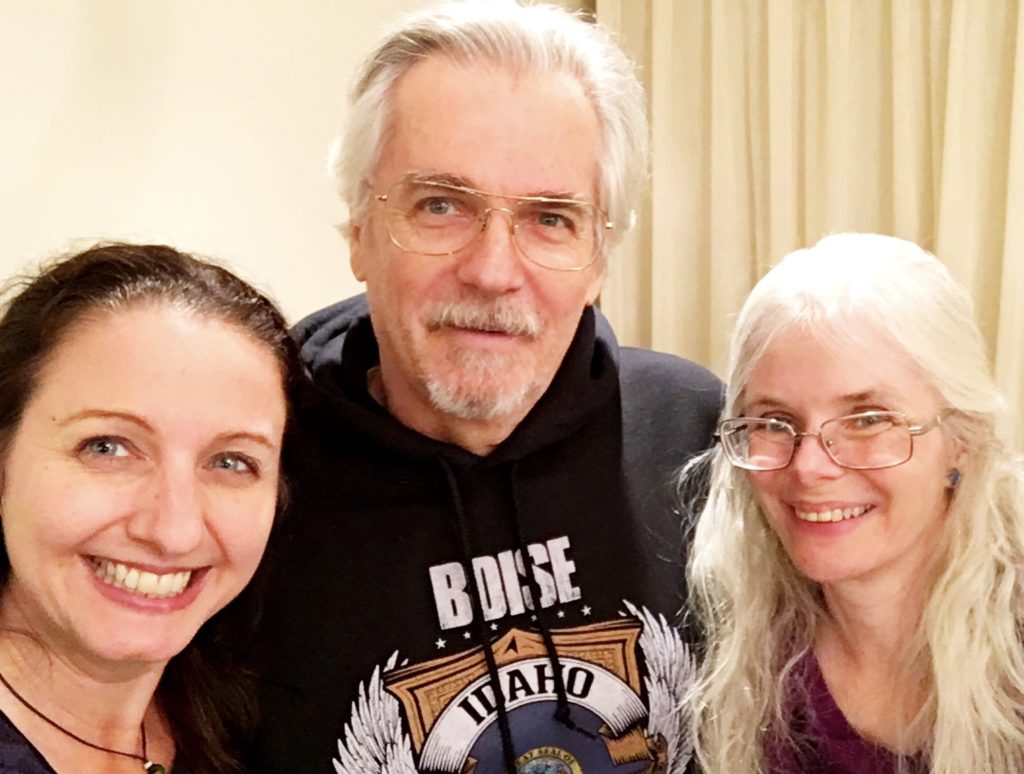
Me With Dean Wesley Smith & Kristine Kathryn Rusch in Oregon, Oct 2017
You can have mentors without them ‘officially being a mentor.’ I have never said to Orna or Dean or Kris, ‘hey, will you be my mentor.’ That’s not how it works. Make sure you choose mentors who are achieving what you want to for the long term. Dean and Kris and Orna have been in publishing for 30+ years and they have survived through the ups and downs. There might be people who can hit the top of the list for a few weeks with one book, who might look like a success, but are they still around in 5 years or 10 years’ time?
(4) All long-term book marketing comes down to one thing in the end
In 2008, I self-published my first book, How to Enjoy Your Job or Find a New One, which I later updated as Career Change. I had 2000 print copies delivered to my house in Brisbane, Australia. They arrived in a lot of boxes and filled our lounge. As they unloaded the truck, I suddenly realized, ‘I don’t know how to sell these.’
So began my investigations into book marketing. I started out with PR and press releases and got on TV and national radio but I soon realized that was not the way to sell books, especially as I wanted to reach the big international markets of the US and UK.
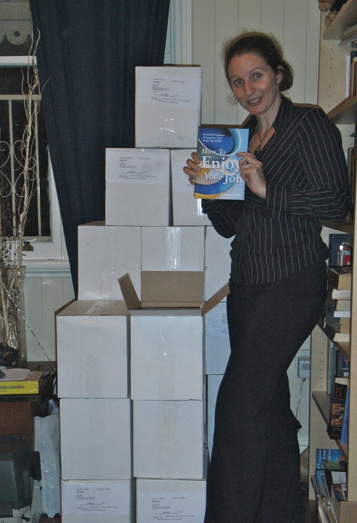
Here’s me with the first edition of what became Career Change. Most of those boxes went to the landfill!
So I started blogging and discovered podcasting and found my first mentor, Yaro Starak, whose Entrepreneur’s Journey podcast and blog and courses helped me design my online business. Yaro continues to be a mentor from afar and I have followed his business ventures, investments and personal travels and pivots over the years. My own Author Blueprint is directly modeled on his Blog Profits Blueprint (with his knowledge and encouragement of course!). I have interviewed him several times and we’ve talked about a lot of things including time and money freedom, as well as travel, which we both love.
We have also both tried pretty much every kind of marketing out there, and Yaro’s been doing this since 2005, even longer than I have. A few words from Yaro coming up.
My book, How to Market a Book, contains most of what I have learned over the years. I’ve experimented with a lot of things, and watched tactics that worked disappear and new ones arrive. If you listen to the entire podcast backlist, you will hear of many of them.
But it’s hard to keep up with all the new things all the time. You have to try things and experiment but at some point, you need to settle on a marketing eco-system that works for you. I talk about this more in Your Author Business Plan mini-course and share more details there.
Right now, this is basically what I am doing and I’m recording this for posterity as much as hoping it helps you since it will be interesting to see what changes over time.
Non-fiction under Joanna Penn
I have 12 books in a series, 11 of which are aimed at authors so there is a lot of cross-selling. There are workbook editions as well as ebook, print, large print and audio for many of them. I have licensed some in other languages – French, Korean, and also self-published some in German. So there is a decent-sized bakery (as per Dean above) and all these books are wide and I also sell from my own store through Payhip.com/thecreativepenn.
I have a permanently free book, Successful Self-Publishing. My primary form of marketing is content marketing with my podcast and my free Author Blueprint email list, as well as appearing on other podcasts, plus Amazon ads that run all the time on all formats of the books. I’ve basically stopped blogging now, preferring audio-first marketing. I am still active on Twitter @thecreativepenn and occasionally at Facebook.com/thecreativepenn.
Fiction under J.F.Penn
I have 3 main series, 10 ARKANE action-adventure thrillers, 3 Brooke and Daniel Psychological Thrillers, 3 Mapwalker fantasy adventure, and a number of stand-alones and short stories. All these books are wide and in multiple formats. I have an email list signup at www.jfpenn.com/free and I have a great ARC team for reviews.
I have a permanently free first in series, Stone of Fire, and I run promos on that. I am also now using BookBub PPC ads for the first in each series running to different stores in multiple countries. I have some Amazon ads on the books, but not much as it’s so expensive. I prefer using BookBub ads, Freebooksy, Bargain Books, Facebook ads on the lesser-promoted stores as the clicks are a lot cheaper, and I care about the income these days, not the rankings unless I am doing a specific promotion.
I have also started the Books and Travel Podcast as content marketing over the long-term. I mainly use Instagram @jfpennauthor and Facebook.com/jfpennauthor but I am not very active on social media in general anymore.
Sweet romance under Penny Appleton
I co-wrote the first 3 of these with my Mum, but she is still writing on her own steam now and we will have book 5 out for Christmas. It is called A Summerfield Christmas Wedding so the timing is important! Because I don’t have the bandwidth to market and Mum doesn’t want to, these books are in KU, I use the free days and run Freebooksy on them, plus we have auto Amazon ads running on those. It’s pretty low maintenance, but remember, my Mum isn’t doing it for the money (although it’s a nice bonus!) so we are not going hard on marketing these.
OK, so that pretty much covers my marketing eco-system, but of course, I do spike promotions as well e.g. apply for a BookBub featured deal and other things.
A lot has changed in book marketing and a lot will continue to change, but one thing remains the same and I think it will become even more important over time as the content tsunami continues to grow.
Here are Yaro Starak and Lindsay Buroker on this topic and they have very different businesses so it’s a good range of perspectives. Yaro is a blogger, podcaster, and sells online courses, while Lindsay Buroker makes her money from fiction sales and they both say the same thing.
Yaro Starak: I think the one element that hasn’t changed is this idea of the cult of personality or a personal brand. And we’ve seen that just become more magnified with, you know, a YouTube personality or podcasting personalities. It’s that sense of connecting with one individual and that’s especially, you know, sort of a coach/clients’ relationship or coach, student, or member that becomes really important because I think what does happen in crowded spaces is if you’re smart, you start to ignore everyone except for the one or two people you really connect with. You know, there’s the Joanna fans, there’s the Yaro fans and because they’ve carried on with us since we first got discovered by them. That’s something that, you know, it’s a relationship you can’t really replace that quickly. They’ll always pay attention to you.
I’m a big fan of the old Kevin Kelly 1000 True Fans concept. That simple idea that you just need to find 1000 people who love your stuff and buy your stuff from this huge internet made up of over a billion people and then that becomes your core income base, your audience, your traffic. It doesn’t have to be millions of views on YouTube or millions of downloads of a podcast or hits to your blog. It’s just that core audience. And that’s become more and more important to me as well over time.
You can listen to the rest of the interview with Yaro Starak on Freedom and Long Term Business Thinking here.
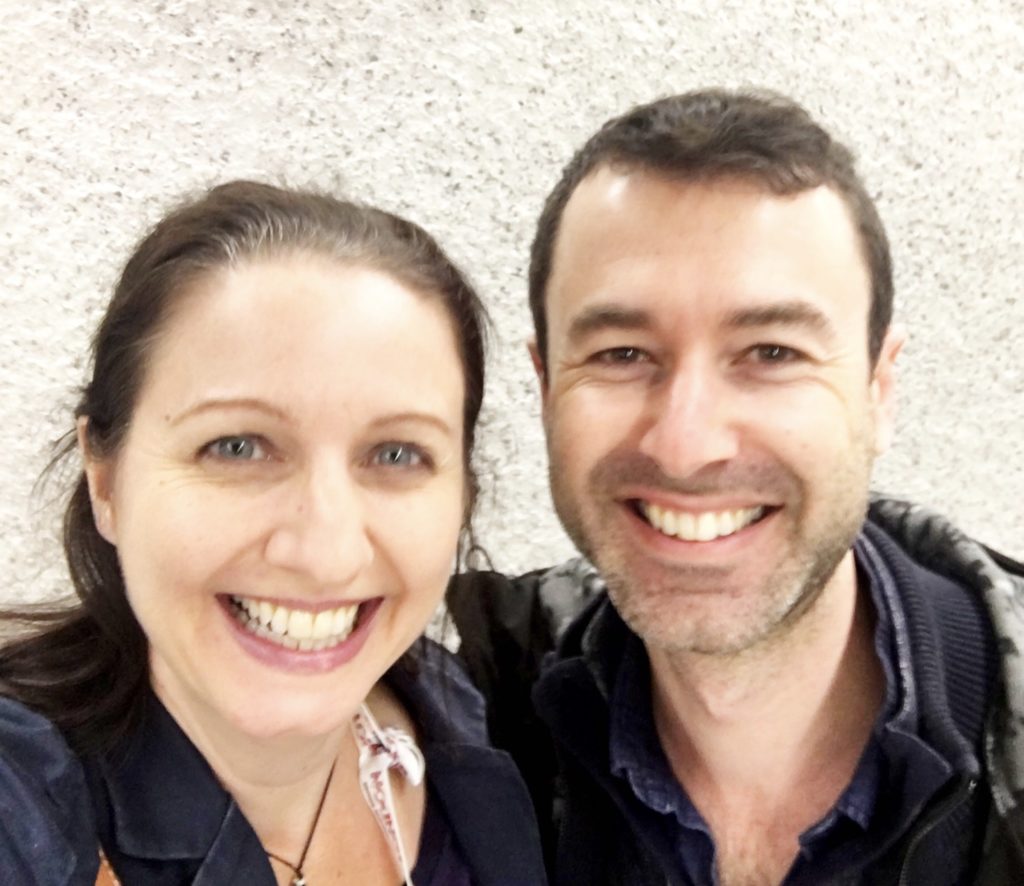
Joanna Penn with Yaro Starak, London 2018
Lindsay Buroker: I’ve never forgotten early on when I started publishing books, I came across Kevin Kelly’s article on 1000 true fans.
And it’s the concept of just building your tribe one person at a time, and if you could get that many people, some of them will tell other people and you’ll have less casual fans, too. I feel like that was very important in me in the beginning and I feel like sometimes we lose track of that. We’re always trying to get new readers by all this advertising on Amazon and I see people sometimes lose focus of the fans they already have.
I try to not let myself do that, like I just sent out a bunch of bonus scenes and a free, short story with the new series I’m doing and somebody emailed it back and they were like, ‘wow, that’s so awesome. No author has ever sent me a free ebook.’ And I was like, really?
Joanna Penn: Well, you need to get on some more email lists!
Lindsay Buroker: Maybe they were thinking traditionally published authors and stuff, but I think even they’ll have to do it, really kind of cultivating the people that you can get and making sure to continue to make them feel like they’re your best customers. They’re the proven people that go out and buy your book at new releases. And it’s a little less daunting too. I think if you just think, all right, one fan at a time.
I’m going to build a fan base and I’m going to treat them really well instead of always just — I mean, you always have to try to get new people into it because things happen. People pass away or people’s tastes change — But I think if you really focus on giving a lot to the people who really have proven that they love your books. I think that’s going to have to be the focus as it continues to be more competitive. If these AI’s you’re talking about start writing thrillers and epic fantasy, you know, you really have to connect with your people by giving them what they love.
I don’t necessarily share a lot personally about what I’m doing. Every now and then, they get a dog picture or something, but I just try to give them the stories that they enjoy. So I think that’s what we’re going to have to do going forward as it’s probably only going to get more competitive, but your people who really love your voice and the way you write, they have maybe similar tastes to you that are out there, you just have to do all this other stuff to find them, but once you find them, nurture them and try to keep them on board. I think that’s always going to be the way to have a solid career and to know that you have somebody to buy the next book that you put out.
You can listen to the episode on writing series with Lindsay Buroker here.
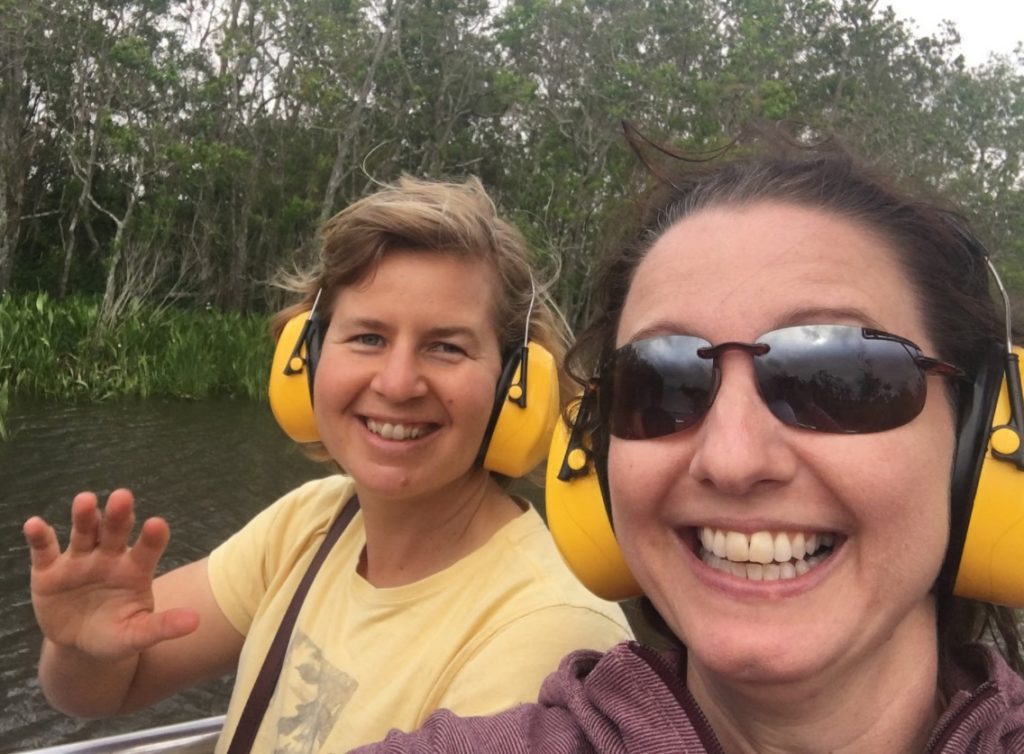
Lindsay Buroker and J.F.Penn on an airboat at the Jean Lafitte reserve, Louisiana, 2017
I am obsessing more and more about 1000 True Fans at the moment. It’s also the heart of the great book, Marketing Rebellion: The Most Human Company Wins by Mark W Schaefer: “We’re moving inexorably toward a subscription-driven, human-driven, emotion-driven, ad-free, funnel-free, big brand loyalty-free world.”
People want connection and fans love supporting the creators they know, like and trust.
That’s why Patreon and Kickstarter and Buy me a Coffee and direct sales are all rising in popularity, and why social media continues to be popular, and why podcasts are exploding. It’s all about connection and that’s what we need to focus on.
I also think indie authors have been too fixated on trying to play the same game as traditional publishers, when we don’t need to. Why compete on the same huge mass-market playing field? Why not just go build our own area just for our fans with all the cool, weird stuff we like and they like, where we can hang out and read books together and sell to our tiny corner of the internet? That’s the idea of 1000 True Fans.
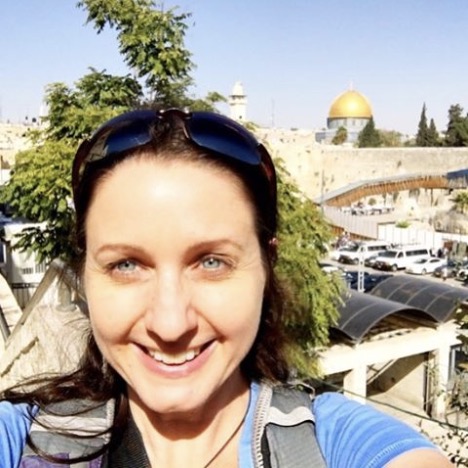
In Jerusalem for book research! I want to do more of this, and less email and admin  You can share my journeys by following along on Instagram @jfpennauthor
You can share my journeys by following along on Instagram @jfpennauthor
The mass market is basically over. The world is fragmenting faster than ever.
There are more and more media channels and places for people to congregate around things they love. Chris Anderson talked about the emergence of the ‘long tail’ back in 2004 but I feel like many people still want to deny the reality of it and have some hope of a blockbuster when that is rarer than ever. Of course, I want a movie deal and a runaway hit as much as the next author, but I don’t want to spend my life pursuing that or defining myself by other people’s definition of success.
Your definition of success changes over the years as you write more books and settle into the career, but for me, at this point, I want to return to my core value which is freedom. Freedom to write what I want, when I want and publish what I want, and make a living writing. I also want to travel when I want, but that is impossible right now under pandemic conditions, but I have confidence it will return!
So, what is your definition of success? For your books, for your author career, for your life? How can you create an eco-system that supports that for the long-term and attract and keep your 1000 True Fans?
(5) Turning Pro and long term thinking. The mindset of the professional author
The life of a writer is a roller-coaster of highs and lows, of triumphs and launches and failure, self-doubt, and imposter syndrome. I wrote The Successful Author Mindset to share my own struggles along the way and I need to remind myself of the lessons within because the creative cycle keeps turning and those feelings return book after book. They don’t go away, you just learn to live with them.
There are a few books that stand out in terms of mindset issues. The War of Art and Turning Pro by Steven Pressfield are two of them and I am privileged to have interviewed Steve several times over the years. The War of Art is an important book to read, but I keep coming back to Turning Pro. I usually read it at least once a year, and this year, I’ve already read it twice. Once in January and last month, June 2020, during lockdown as I reassessed what I want to achieve with my life — as we all have been reassessing life during the pandemic!
I highly recommend the book if you want to challenge yourself around your art and what you want to spend your life doing. Because life is short. Memento mori, remember, you will die. Turning Pro will help you focus.
In this interview from 2014, Steve talks about the moment he decided to turn pro.
Steven Pressfield: When I was trying to learn to be a writer and was falling on my face over and over and over, the reason I decided finally was that I was an amateur. I had amateur habits and I thought like an amateur and what turned the corner for me was just a simple sort of turning a switch where I just decided — I’m going to turn pro. I’m going to think like a pro.
Athletes are great models for this. One of the things about a professional athlete is that they will play hurt. Right. You sprain your ankle or something’s wrong, you say, well, I won’t do it today, you know, but a pro goes every day. A lot of times, the model for being a pro is just what we do in our jobs. Like in our day jobs, we show up every day whether we want to or not, right. We have to get a paycheck.
But when we go into our work or passion or novels or books or whatever, we suddenly become amateurs. We think, wow, this is really hard. I’m going to, you know, go to the beach. We don’t have that kind of hardcore professional attitude.
Courage plays a lot. It takes a lot of guts to do this. Patience is also very important, to be patient with ourselves, allow ourselves to fall off the wagon sometimes. Taking the long view is another aspect of it.
I like to think of it as a lifelong practice. It’s not just one book. It’s not three books. This is what we’re going to do for the rest of our lives. This is what we do.
Another aspect, I think of a professional and this comes from the Bhagavad Gita. It’s a kind of a mentor/protegé story, a Hindu scripture, where the protegé is Arjuna, the great warrior and the teacher is Krishna, who was his charioteer, in other words, God in human form. So God is teaching mortal men.
One of the things that Krishna says is “we’re entitled to our labor, but not to the fruits of our labor,” and what he meant by that is like, we finish a book, it goes out, it’s published.
And then we’re like, okay, glued to the reviews, you know, we get a four-star and anybody gonna give us money. Right? What Krishna is saying is that’s not the way the world works. The satisfaction needs to come from the work itself from doing the work itself so good or bad, whatever the response to our work is, that doesn’t matter.
Even within those few minutes, Steve says so much that is challenging, and every year, I have to ask myself, have I turned pro? Am I behaving like an amateur? Where can I become more professional? Am I paying too much attention to the fruits of my labor, when I should be concentrating on the work itself? Seriously, go get the book, Turning Pro. It’s short, like many of Steve’s books, but it is intense!
In thinking about the long-term, I also wanted to add these clips from Kristine Kathryn Rusch, followed by Kevin J Anderson who both talk about the importance of thinking of your author career over the long term, and how there will always be ups and downs. These interviews were clearly recorded before the pandemic, but we’re seeing an example of how things can change so quickly right now in these weird times.
Kris Rusch: One of the things I think indies need to do is they need to think longterm. And they’re not. They’re thinking next week or this sub-genre is hot right now and I’m going to write it and I’m going to sell a million books on Amazon, not thinking that everybody’s writing that sub-genre and people are going to eventually stop reading it because they’re not writing from their heart.
So indies need to realize that if they’re in this, they’re in this for the long haul and the long haul isn’t two years from now, the long haul is 20, 30 years from now. And their planning needs to be based on that. And that’s hard to do, especially if you’re just starting out or you need money, or you took that plunge and you dumped your day job and now you’re trying to earn money every day. That’s a hard position to be, and you have to balance that day to day with the longterm view.
Listen to the full interview on how authors can empower themselves here.
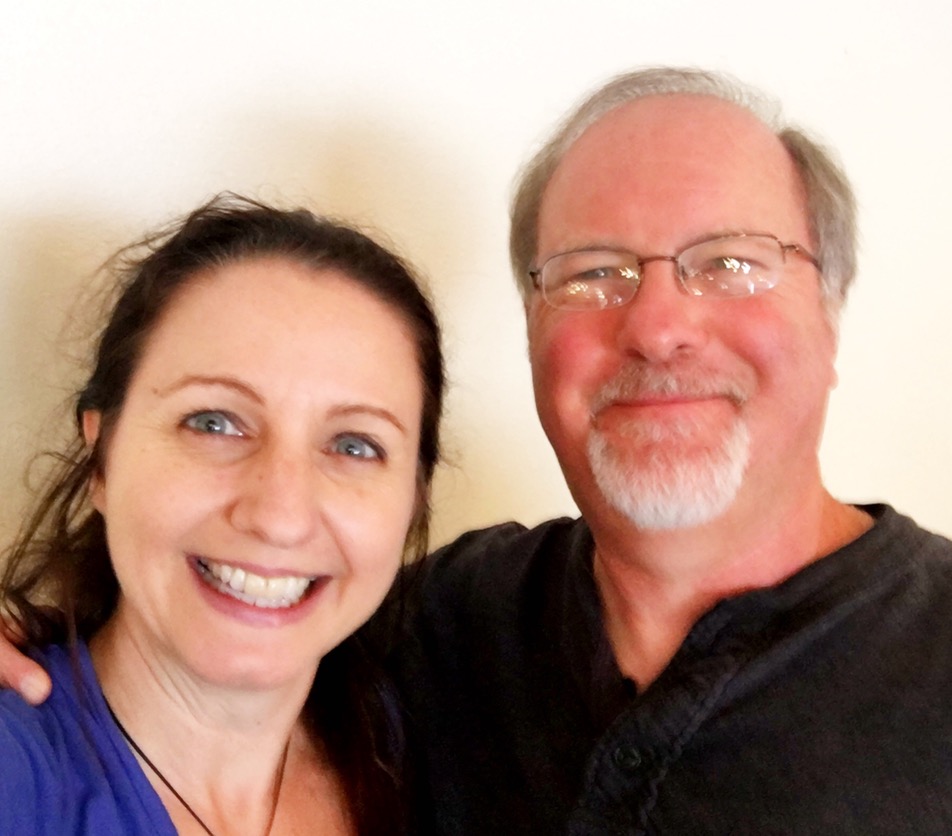
Joanna Penn with Kevin J Anderson in Oregon, 2017. Looking a bit windswept!
Kevin J Anderson: What do you do when it takes 20 years? Well, it may well take 20 years, so don’t quit your day job if you’ve got something. If you have a good year and a lot of money comes in, don’t assume that next year is going to be the same.
Publishing is like a roller coaster, it’s up and down and up and down. It’s similar to the music industry. If you have one hit, don’t assume that your next one’s going to be a hit. So when you do have money, you need to save well, invest it, prepare for times when it’s going to be a crash, and just don’t think that it’s going to keep going.
I was just at the 20 Books to 50K conference in Las Vegas where there were literally a thousand attendees, all of them ambitious indie authors. We’re kind of in gold rush days and it’s a big boom and everybody’s running big ad campaigns. From an industry-wide perspective, this is still like a new and disruptive part of the business and it’s changing a lot. And I talked to a bunch of the people who were at 20Books and I said, ‘guys, you haven’t had your first huge boom and bust cycle yet.’ A lot of them are still kind of on this big upswing, but — and I’m not being a doom and gloom person, but that’s just the way the industry works — something’s going to crash in some part of it and you’ve got to be prepared for that.
And I kind of make the joke that in my own career, I’ve crashed and burned and then picked myself up and then crashed and burned and then picked myself up so many times, and resurrected my career, I call myself the doctor sometimes, I’m like the 11th doctor now or something like that. And, I’m still going. I’m still publishing. I just made a really huge traditional book deal and I’ve got a whole bunch of indie books that we’re publishing. I’m also this very, busy and happy professor at Western Colorado university where I’m teaching a publishing master’s degree. It’s just all kinds of things are happening. These are all lightning rods that I planted and you never know when something’s going to strike, but, but you have to be ready for it and keep creating.
Listen to the interview on long term success as a writer with Kevin J Anderson here.
Next steps: What’s changing?
Things have definitely changed for me as a result of the pandemic. I’ve had time to reflect on what I want to achieve, how I want to spend my time, and what my definition of success really is.
In the last decade, I have ‘turned pro’ at running a non-fiction business. I’ve spent 80-90% of my time on the non-fiction side of things and it has been fantastic, but it’s time for a change. I am starting to have more confidence around my fiction and I want to give it more of my time. What could I achieve as J.F.Penn in the next decade if I gave that brand as much attention as I have given Joanna Penn?
My husband, Jonathan, has also had time to think and we’ve talked about a lot of things on our daily walks along the canal during lockdown. The big change is that he is leaving the business to restart his own career. He is a statistical programmer in the medical and pharmaceutical industry, and let’s face it, that is a useful place to be right now!
He has been under-utilized in our business for a while and work is not just about money anyway — it’s also about meaning. The Creative Penn was always my business first, focused on my passions, and even though it makes enough income to sustain us both, it does not provide enough meaning.
It’s been a good 5 years, for sure. Jonathan left his last job in 2015 and helped me put in place some great procedures and processes, including ramping up our investments, as well as using tools like 1Password and Dropbox which make the business more robust. He set up my Amazon Ads for the non-fiction books and they basically run with very little intervention now. He took charge of my YouTube channel and did a lot of editing, photography, and other work on the brand, as well as helping me with Curl Up Press and rights licensing. We’ve done a lot of great research trips together — but it has served my career, not his.
In our wedding ceremony back in 2008, we included words from Kahlil Gibran, “Stand together yet not too near together: For the pillars of the temple stand apart, And the oak tree and the cypress grow not in each other’s shadow.”
With The Creative Penn, Jonathan has been in my shadow and now it’s time for him to step back out and rebuild his career. I will stand alongside him and focus on mine, and we will have our evenings and weekends and holidays together. I’m looking forward to doing more cultural research trips on my own as well, and he’s looking forward to some relaxing beach holidays. We can manage both in this new phase of life!
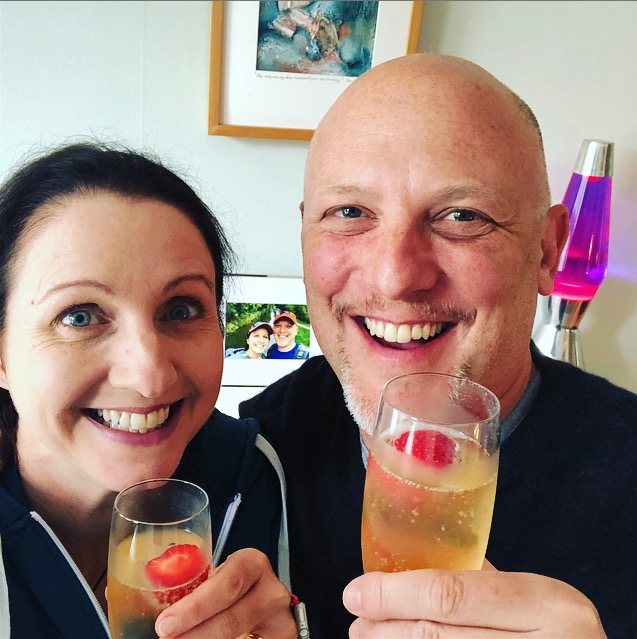
I wanted to share this openly as I know many of you dream of hiring your partner out of their job to join you in your writing business. My first goal as an author was always six figures as that would replace my income as an IT consultant. I achieved that in 2011 and left my job. My next goal was to hire Jonathan out of his job so he could join the business and we could both be ‘free.’ I achieved that in 2015.
But it turns out that my writing dream is not enough for both of us and ‘freedom’ is elusive. I created more of a job for myself, working long hours with no paid leave or sick pay. I’ve barely had a weekend off in a decade. I love what I do — but I need to put more sustainable practices in place. I need to learn to embrace the rest ethic (as per Max Frenzel in episode 492) and the structure of Jonathan’s job will enable me to work his hours and make the most of time off.
The world is also shifting in many ways and I have always talked about the importance of multiple streams of income. Jonathan returning to a day job provides another stream of income to our household and is about as different as writing and publishing as you can get so we have increased diversity.
I’ve also learned that I don’t want to grow The Creative Penn. I am quite happy with being a small business. I still have ambition around income and creative goals but I like the idea of the 7-Figure, One-Person Business as discussed with Elaine Pofeldt, and the 7-Figure Small idea (interview with me on that podcast here), and how to be a successful Company of One as discussed with Paul Jarvis.
So I am happy with the business being back to just me again. Although to be clear, I have a wonderful team to help. Thanks in particular to Alexandra, my wonderful VA; to Jane, my book cover and graphic designer; to Jesper for the podcast production; and to Jen and Wendy for editing and proofreading. I also have an accountant and other contractors who do specific jobs. So technically, it’s not just me, but I do the creative work and run the business and manage everyone with no employees.
So what does this change mean?
Not so much for you, my wonderful podcast listeners! I now define myself as an author and a podcaster, as both bring me creative and business opportunities. I want to do more audio-first projects, so there will likely be more audio, not less over time.
My podcasts are part of my creative body of work. Books and Travel feeds my soul and the wanderlust of my listeners. I also love helping people and sharing the author journey, so I am committing to episode 600 of The Creative Penn Podcast — but I’m not going to promise it will be every Monday for the next two years.
I’ll be taking time off some months, for example, I have booked December out on my calendar, although of course, I will do my annual round-up on 31st as I do every year! I’m also going to batch my interviews so I have more continuous time without interruption. In the next 2 weeks, I’m recording interviews that will take us into 2021 for both The Creative Penn and Books and Travel.
So what am I doing to make space for more of J.F.Penn?
I’m going to say ‘no’ more.
My first instinct is always to say ‘yes’ to myself and others — to speak at an event, to build a course, to write another non-fiction book or update an older edition, to do another webinar — because I know how to make money that way. But writing fiction requires me to sink down into a deeper level, and I need longer chunks of time for that to happen.
I’m not saying no to everything, of course. I will still speak at select events and I will still write non-fiction books, but the balance is changing. I will spend my next decade focusing primarily on my fiction career as J.F.Penn, and also writing more non-fiction that relates to my fiction brand, maybe the travel memoir I’ve talked about, maybe the ever-elusive Shadow Book that still nudges me now and then, maybe other things.
Even though 2020 has not turned out the way any of us expected, I did make Operation Evergreen my focus for the year and much of what I wrote on 1 Jan still stands. The pandemic has given me the time off that I needed and forced me to really think about things that have been percolating for a while anyway. It truly feels like a new beginning. I hope you can also find a silver lining and that you have had time to think as well.
So to end episode 500, I want to ask you a few questions.
- What were you doing in March 2009 when I started this podcast? What did your writing situation look like?
- What writing goals have you achieved in the 11 years since then?
- If you haven’t achieved the goals you wanted, then why not? Were they the wrong goals? Or do you need to refocus?
- What lessons have you learned along the way?
- What is the silver lining in the pandemic for you?
I’d love to hear your thoughts on this episode. Please leave a comment or tweet me @thecreativepenn or you can email me through the Contact page.
Thanks for joining me on the author journey and thanks for your support of the podcast. I fully intend to keep creating for the next 11 years but in the meantime, I’ll be back next week with episode 501. Time marches on! Happy writing and I’ll see you next time.
Go to Source
Author: Joanna Penn

